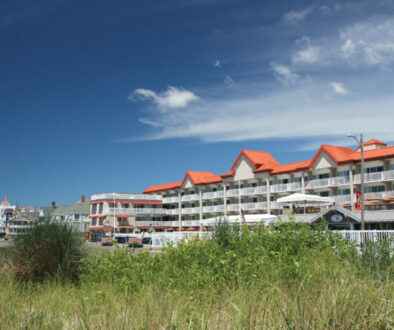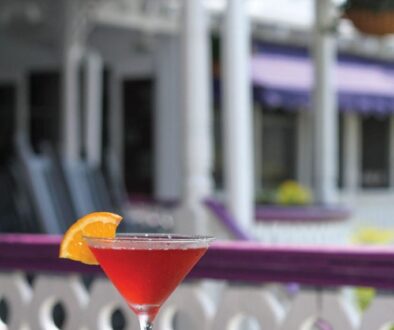To B&B or not to B&B …that is the question

Definition: A bed and breakfast (B&B) inn is defined as a private residence that offers sleeping accommodations to lodgers in 14 or fewer rooms for rent, is the innkeeper’s principal residence while renting rooms, and serves breakfast at no extra cost.
One of my favorite things about this job is writing the You Are Here column. It gives me the opportunity to stay at different lodging venues around town, and to write about it from the perspective of a guest. I can experience the amenities, the ambience, the food—in some cases, and, hopefully give our readers a sense of what it’s like to be here even when they can’t be here; hence the name. I’ve stayed at hotels, motels, and bed and breakfast inns. The latter, at least for me, have always been synonymous with Cape May for more than 25 years, which is when I first started vacationing regularly here.
According to industry website bedandbreakfast.com, the B&B movement was a natural outgrowth of the practice of accommodating stagecoach travelers back in the 1700s, when homeowners would offer stables for horses to rest, along with a bed and a cheap meal for weary travelers. After travel abroad became more prevalent post WWII, Americans became smitten with bed and breakfast inns in the U.K., and a boom was born here in the U.S. The number of B&Bs nationwide peaked in the 1980s—and here in Cape May in the 1990s—but the industry as a whole lagged in promoting itself, relying largely on advertisement in guidebooks that took up to a year to produce. The advent of the internet was key in “leveling the playing field,” according to the site, making the advertising and promotion of the inns that much easier, and putting them in position to compete with hotels and motels.
We spoke with some of Cape May’s B&B industry insiders about the particular appeal of the bed and breakfast experience when it comes to choosing a place to stay, including Tom Carroll, rightfully credited for putting Cape May on the B&B map when he and his wife Sue bought the original Mainstay in 1972 (see the August 2015 issue of Cape May Magazine for Bob Dreyfuss’ excellent article “In The Beginning” about The Mainstay and the start of the B&B boom here). We asked him specifically about the best part of being an innkeeper, and his response illustrated one of the bed and breakfast inn experience’s biggest draws: the rapport established between hosts and guests in a smaller, more intimate environment. “The first wave of innkeepers, like ourselves, really wanted to be hands on, and to become friends to their guests,” Tom told us. “As it appeared to others that we were making money at it as well, it attracted investor/owners, who tried just hiring people to run the inns for them. In some cases this has worked okay, but in others it hasn’t created the experience B&B people were looking for. The guests were my favorite aspect of innkeeping. We had really wonderful folks, and we became the best of friends with many of them.” Tom and Sue have since retired, and split their time between Philadelphia and Cape May, where, he notes, “We’re pretty happy any time of year.”
Patti Goyette is the innkeeper at the Mason Cottage, and she also mentioned that feeling of being connected to guests. “I get to do what I love, surrounded by the feeling of home. Making yummy things in the kitchen, with ‘family’ rocking away on the porch, and the dog watching out of the corner of his eye from our living room,” she said. There is, of course, a downside to having “family” in your house. When asked about her least favorite aspect of the job, Patti responded: “Laundry. Yep, laundry. It never ends.” Patti stays at other B&Bs when she travels, but added that “In order to feel completely ‘off’ and truly like I’m not working, I need the five stars and the anonymity of a big hotel once in a while.”
For Leslie Valenza, who owns and operates The Mooring with partner Vince Casale, these are familiar sentiments. She and Vince often stay at other B&Bs in their off-season travels, some of them in other countries. “We are always looking for new ideas and fresh ways of doing things,” Leslie said. “We don’t want to become stuck in a rut, so it’s always refreshing to see how other inns operate.” And sometimes, she admits, “The takeaway can be ‘Okay, let’s not ever do this!’” From her purview as both a B&B operator and a frequent guest, Leslie believes that the bed and breakfast experience is a singular one. “Individuality in decor, personality (of the innkeepers), food service and the ‘style’ of the inn…we’re not pasteurized and homogenized. For me, there is a bit of adventure to staying in a B&B. Like Forrest Gump said about chocolates: you never know what flavor you’ll get until you take a bite!”
Diane Hutchinson, who owned and ran The Fairthorne Cottage Bed & Breakfast Inn on Ocean Street along with her husband Ed for 24 years before selling in 2014, readily agrees. “The bed and breakfast experience is about peaceful relaxation,” she told us. “Most B&Bs in Cape May have ten or less rooms, and they don’t accommodate children under the age of twelve. You are treated as special guests visiting from out of town.” When the Hutchinsons sold The Fairthorne in 2014, it became a private residence, indicative of a trend towards both private residences and conversions of bed and breakfast inns to whole-house rentals in recent years (see next page).
Cape May is a town that is full of truly outstanding places to stay, whether you choose a hotel for your vacation or an inn—ask me, I know. The difference seems to be that one selects a hotel for the convenience or the amenities: a specific locale, multiple beds or a pull-out sofa in one room, kids’ activities, or things like elevators, perhaps a restaurant or a pool onsite. One selects a B&B, however, for a completely different reason. The smaller size lends itself to more romantic getaways, as opposed to an extended family vacation. B&Bs also provide the experiences of a bygone era, things like teatime, or sitting in a rocker on a wooden porch. There are fewer guests, a more intimate physical space—you’re probably sitting down at a communal breakfast table, and engaging in one-on-one communication with an owner or innkeeper, as well as having the sense that you are a guest in someone’s home, particularly if there is a long history attached to that home.
As Patti puts it, “I have so many guests that come back and tell me it’s just like coming home. I translate that to ‘Going home to Mom.’ I, too, love going home and having mom take care of me. I like to think that is my little contribution to the nurturing side of life that everyone craves and needs, even if they didn’t know they did.”



